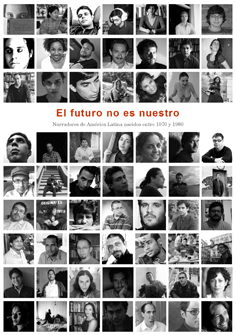Isolation and high prices have held back new talented writers in Latin America. It is difficult for someone in Colombia to hear about a rising Venezuelan author. A work by a Peruvian author, well-known in Spain, may be hard to come across in a Costa Rican bookstore. Where books are available, they are often too expensive to be purchased by the general population. Peruvian author Diego Trelles Paz has taken a step toward addressing this disconnect with “El futuro no es nuestro” (The Future is not Ours), a two-part anthology of rising talent in Latin American literature.
Trelles, author of “El círculo de los escritores asesinos,” spent a year and a half compiling the anthology and had only two requirements: the prose had to be excellent and the writer had to be of the generation born between 1970 and 1980. His aim was to capture the “generational spirit” of a group born right after the student massacre in Tlatelolco, Mexico City and the protests in Paris of 1968. It’s a generation educated by parents marked by the Latin American military dictatorships and that witnessed the fall of the Berlin Wall, the end of the Cold War, the birth of the Internet, the murders of Ciudad Juárez, Mexico, and the September 11th attacks in New York City. For Trelles, it was important that this anthology reflect the multi-faceted generation of writers coming from the region—”the anthology seeks to set a certain distance with what’s come before,” he says.
The variety of voices and backgrounds is seen in the content of the narratives included in the anthology. In the introductory text to the digital edition, Mexican author Naief Yehya writes, “Here  we have the opportunity to visit…[everything from] villages attempting to preserve their traditions in the modern world, children of the Sandinista revolution re-educated in consumerism, [to] the invasions of giant, sick turtles.”
we have the opportunity to visit…[everything from] villages attempting to preserve their traditions in the modern world, children of the Sandinista revolution re-educated in consumerism, [to] the invasions of giant, sick turtles.”
The digital anthology brings content directly to the
reader. Including 63 authors from 16 Latin American countries, the full-text anthology is available free of charge at Piedepágina, a literary journal based in Bogotá, Colombia. Trelles explains, “’El futuro no es nuestro’ is a writer’s anthology and…we are most interested in being read and in marking our own territory as a new group of Latin American writers.”
And because writers need to eat, a print edition, which includes different stories by many of the same authors in the digital version, will be available for sale, with profits going to the writers. The edition is scheduled to be launched in February 2009 by Argentine publishing house Eterna Cadencia, and Trelles is currently trying to get it published in other countries.
“El futuro no es nuestro” is generating buzz both in Latin America and the U.S. The print edition is being translated into English and a shorter version of the digital anthology is available in Bulgarian. Francis Ford Coppola’s short story magazine, Zoetrope: All-Story, has contracted Trelles along with writer Daniel Alarcón, associate editor of Peruvian magazine Etiqueta Negra, to edit a special issue on Latin American narrative. These projects, Trelles hopes, will serve to unify somewhat the “divergent and disaggregated family” of Latin American writers living all over the world.



